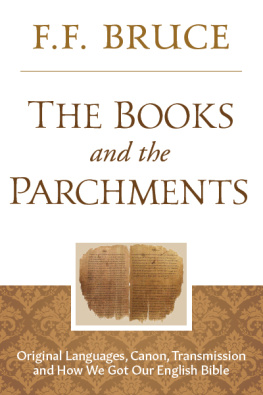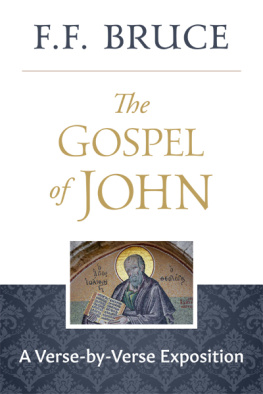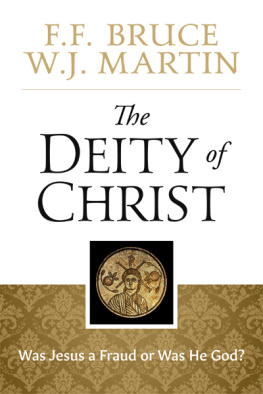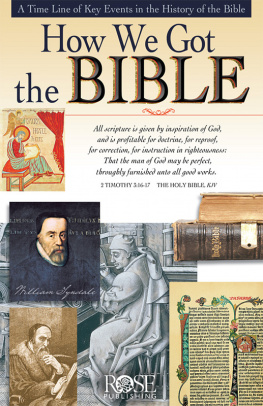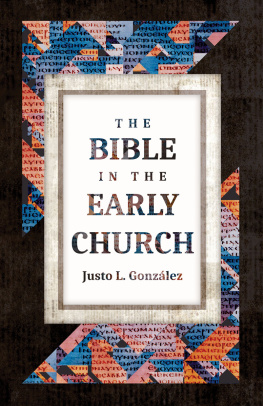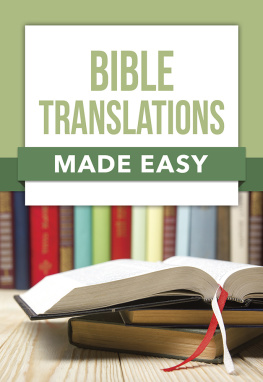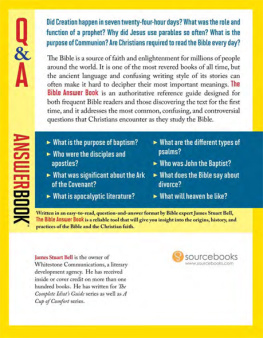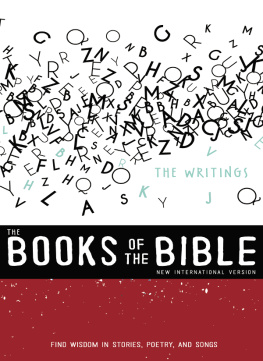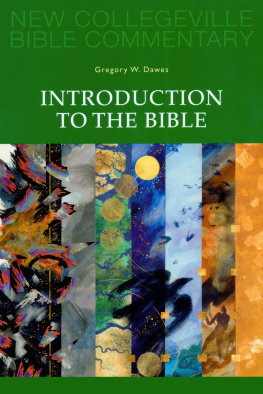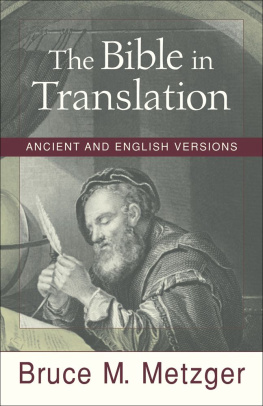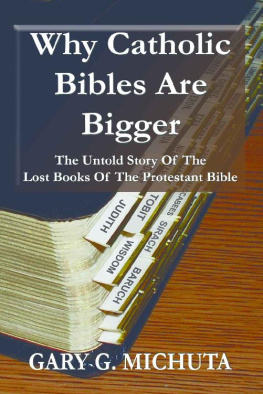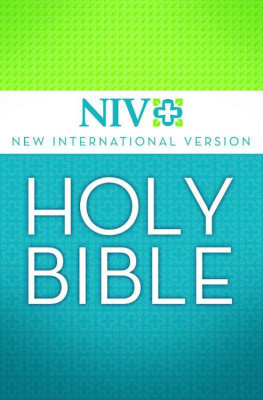CHAPTER 1
THE BOOKS AND THE PARCHMENTS
A BOUT THE MIDDLE OF THE 19TH CENTURY there came to light a letter in William Tyndales hand, written in Latin to someone in authority (possibly the Marquis of Bergen), which had lain unread in the archives of the Council of Brabant for three hundred years. The letter has a special human interest because it was written during the last winter of Tyndales life (153536) while he lay in prison for the word of God and the testimony of Jesus, and it shows us how the great Bible translators enthusiasm for his work remained unimpaired to the last, in spite of the most discouraging circumstances. This is what he wrote:
I believe, right worshipful, that you are not unaware of what may have been determined concerning me. Wherefore I beg your lordship, and that by the Lord Jesus, that if I am to remain here through the winter, you will request the commissary to have the kindness to send me, from the goods of mine which he has, a warmer cap, for I suffer greatly from cold in the head, and am afflicted by a perpetual catarrh, which is much increased in this cell; a warmer coat also, for this which I have is very thin; a piece of cloth, too, to patch my leggings. My overcoat is worn out; my shirts also are worn out. He has a woolen shirt, if he will be good enough to send it. I have also with him leggings of thicker cloth to put on above; he has also warmer night-caps. And I ask to be allowed to have a lamp in the evening; it is indeed wearisome sitting alone in the dark. But most of all I beg and beseech your clemency to be urgent with the commissary, that he will kindly permit me to have the Hebrew Bible, Hebrew grammar and Hebrew dictionary, that I may pass the time in that study. In return may you obtain what you most desire, so only that it be for the salvation of your soul. But if any other decision has been taken concerning me, to be carried out before winter, I will be patient, abiding the will of God, to the glory of the grace of my Lord Jesus Christ; whose Spirit (I pray) may ever direct your heart. Amen. W. TINDALUS
It requires little imagination to sympathize with his desire for warmer clothes. A damp, draughty, unheated cell is no place to pass the winter in, and it is difficult to concentrate the mind on study if the body is shivering. But we get the impression that Tyndales desire for warmer clothes was but a means to an end; he wished to reduce his bodily discomfort sufficiently to let his mind get on with its chosen work. Most of all he wants his Hebrew books. And why? Because a good part of the Old Testament remained to be translated. Some years previously he had translated the New Testament into English (the first time that it had ever been englished from the Greek original), and he was at work on the first translation of the Old Testament from Hebrew into English when he was arrested. The Pentateuch had been published in 1530; the historical books had also been translated but not yet published. So he was anxious to press on with the task. But the completion of it must be left to others. On the 6th of October, Tyndale himself, in the words of John Foxe, was brought forth to the place of execution, was there tied to the stake, and then strangled first by the hangman, and afterwards with fire consumed, in the morning at the town of Vilvorde, A.D. 1536; crying thus at the stake with a fervent zeal and a loud voice, Lord, open the King of Englands eyes.
We cannot read the letter which Tyndale wrote from prison without remembering the remarkably similar request made by the apostle Paul in remarkably similar circumstances. It was just before the last winter of his life, while he lay in prison in Rome awaiting the death sentence and the executioners sword (according to the traditional account), that he sent a message to his friend, Timothy, in Asia Minor. Do your best to come to me soon... When you come, bring the cloak that I left at Troas with Carpus, and the books, especially the parchments... Do your best to come before winter (2 Timothy 4:9, 13).
The comfort of the body is not to be neglected, but something to occupy the mind is the main thing. Most of all... the Hebrew Bible was Tyndales plea; especially the parchments was Pauls.
It has been suggested that the word translated cloak in Pauls message was not really a cloak. The Greek word is phailons , borrowed from the Latin paenula , and sometimes it means a piece of cloth to wrap around books to protect them against the weather. And it is suggested that Paul was more concerned about protecting his books than about protecting his body. Perhaps we can have it both ways. Paul may have left his cloak at Troas wrapped round the books, but in view of his reference to the approach of winter it is not difficult to surmise that he asked Timothy to bring it so that he could wrap it around himself. And then, with a little less discomfort, he could get down to the books and the parchments.
But what were these books, and what were the parchments which Paul was so especially anxious to have? The Greek words that he uses to indicate them are interesting. They denote primarily the material of which the two classes of documents were made. The word for book is biblion , and that for parchment is membrana.
A biblion was more particularly a roll of papyrus or byblus. This was a reed plant growing beside rivers and marshes and such places, the inner bark of which was extracted and dried in flat strips. When these strips were dried, a row of them was laid side by side, and above this another row was laid in criss-cross fashion, and the two rows were gummed together. The result was a piece of writing material. Several of these pieces could be joined together end to end so as to form a long strip which was then rolled up into a scroll of convenient size, called in Greek a biblos or biblion . This name was derived from one of the names of the plant itself, byblos , which is related in turn to the name of a town in Phoenicia which the Greeks knew as Byblos. (The form biblion is really a diminutive of biblos , but lost its diminutive sense. In the New Testament biblion simply means a roll or book. When a diminutive word is required, as for the little book which John was told to eat in Revelation 10:9, the form biblaridion is used.) It is from biblion , in fact, that our word Bible is derived. The plural of biblion is biblia , and the whole collection of Old and New Testament books came to be known by Greek-speaking Christians as ta biblia , the books. Latin-speaking Christians then borrowed the word biblia but treated it as a singular noun, and from its Latin use the English word Bible and similar forms in many other languages have been derived.
The other documents which Paul asked Timothy to bring were parchments. The Greek word here is membrana , a word borrowed from Latin, from which, of course, comes our English word membrane. This is an animal and not a vegetable product, the skin of sheep, goats, antelopes, and similar animals, which was shaved and scraped to provide a more durable writing material than papyrus. The word parchment comes from the name of the city of Pergamum, in Asia Minor, for the production of this writing material was at one time especially associated with that place. Parchment made from calfskin is called vellum.
In New Testament times, parchment, being more durable and more costly than papyrus, was used chiefly for documents of greater value, or for such as were constantly in use and were, therefore, exposed to greater wear and tear. What the parchments were which Paul so particularly desired Timothy to bring we cannot be sure, but it is a reasonable guess that they contained portions of Holy Scripture.
A book with leaves and pages in the form familiar to us was not used before New Testament times, though this kind of book (known technically as a codex ) made its appearance about the end of the apostolic age and quickly became popular in Christian circles. The books mentioned in the Bible were rolls of papyrus. The use of papyrus for writing purposes in Egypt goes back to c . 3000 B.C., and we have evidence that by the end of the twelfth century B.C. it was exported in large quantities from Egypt to Phoenicia for the same purpose. Such a papyrus roll is that which John saw in his vision of heaven (Revelation 5:1), which contained so much writing that the outside ( verso ) was covered with it as well as the inside ( recto ), and which when rolled up was secured with seven seals. Usually rolls bore writing on one side only, the side on which the fibers ran horizontally and which was therefore easier to write on. The Roman poet Juvenal satirizes one of his contemporaries who wrote a tragedy called Orestes , which was inordinately longso long that it covered the outside of a roll as well as the inside, and was not finished even then:
Next page
